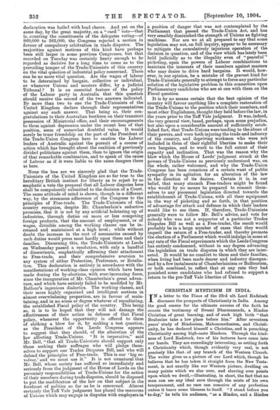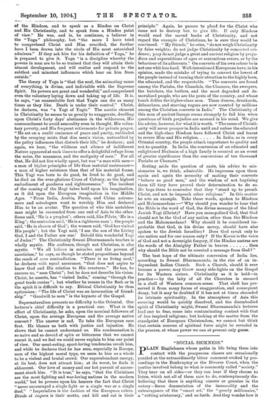I N a letter to the Times of the 23rd ult.
Lord Radstock discusses the prospects of Christianity in India. Among the good omens for the ultimate success of the faith he counts the testimony of Swami Dharmananda, a Hindoo Christian of great learning, and of such high birth "that Brahmins take a low place before him." After seventeen years' study of Hindooism, 3fahommedanism, and Christi- anity, he has declared himself a Christian, and is preaching Christianity among high-caste Hindoos. Through the kind- ness of Lord Radstock, two of his lectures have come into our hands. They are exceedingly interesting, as setting forth a Christianity which, though evidently very real, is not precisely like that of any branch of the Western Church. The writer gives us a picture of our Lord which, though he believes that he has taken it straight from the New Testa- ment, is not exactly like our Western picture, dwelling on many points which we slur over, and slurring over points upon which we dwell,—illustrating, in short, the fact that no man can see any ideal save through the mists of his own temperament, and no race can conceive of any perfection unless it bears some likeness to itself. "I stand before you to-day," he tells his audience, "as a Hindoo, and a Ilindoo
of the Hindoos, and to speak as a Hindoo on Christ and His Christianity, and to speak from a Hindoo point of view." He was, and is, he continues, a believer in the "Yoga" philosophy, but "the more I have tried to comprehend Christ and Him crucified, the further have I been drawn into the circle of His most astonished admirers." If they ask him for his definition of "Yoga," he is prepared to give it. Yoga "is a discipline whereby the powers in man are to be so trained that they will attain their utmost development, and will realise and respond to the subtlest and minutest influences which bear on him from outside."
The theory of Yoga is "that the soul, the animating cause of everything, is divine, and indivisible with the Supreme Spirit. Its powers are great and wonderful," and comprehend even the voluntary laying down and taking up of life. It is, he says, "an unassailable fact that Yogis can die as many times as they like. Death is under their control." Christ, he declares, was "a Yogi of Yogis." The ascetic element in Christianity he seems to us greatly to exaggerate, dwelling upon Christ's forty days' abstinence in the wilderness, His commandment to avoid sensuality even in thought, His volun- tary poverty, and His frequent retirements for private prayer. "He sat on a sunlit eminence of peace and purity, unblinded by the creeping mists that dim men's vision, untroubled by the paltry influences that disturb their life," he declares ; and again, we hear, "the wildness and silence of indifferent Nature appeared at such times to offer a delightful refuge from the noise, the meanness, and the malignity of men." For all that, He did not live wholly apart, but was "a man with men— a man of higher principles of life than material sustenance— a man of higher existence than that of his material frame. This Yogi was born to do good, he lived to do good, and he died on the ever-glorious Cross of Calvary, as the highest embodiment of goodness and righteousness." The incident of the coming of the Magi takes hold upon his imagination, as it did upon the European imagination in the Middle Ages. "From India, Arabia, Persia, and China astrono- mers and astrologers went to worship Him and declared Him to be an avatar. The question of who this matchless man might be resounded from one end of Asia to the other. Some said, He is a prophet'; others said, like Pilate, 'He is a King'; the centurion said, He is a righteous man '; the people said, 'He is chosen of God'; the women said, God has visited His people ' ; but the Yogi said, I am the son of the Living God, I and the Father are one.' Behold this wonderful Yogi of Judea!" The Christianity Swami Dharmananda teaches is wholly mystic. His audience, though not Christian, is also mystic. "We all believe in miracles and the powers of asceticism," he says, as though he stated propositions beyond the reach of sane contradiction. "There is no living soul," he declares with equal assurance, "that does not aspire to know God and His relation to His creatures." He has, he assures us, "seen Christ"; but he does not describe his vision. Christ, he asserts, has "visited India," coming "through the great trade routes " ; but whether he means in the flesh or in the spirit it is difficult to say. Ethical Christianity he thus epitomises : "The life of Christ was an incarnation of friend- ship." "Goodwill to men" is the keynote of the Gospel.
Supernaturalism presents no difficulty to the Oriental. Our lecturer's chief difficulty is a practical one. What is the effect of Christianity, he asks, upon the nominal followers of Christ, upon the average European and the average native convert ? The answer is sad. To take the European case first. He blames us both with justice and injustice. He shows that he cannot understand us. His condemnation is so naive and so devoid of spite or bitterness that we cannot resent it, and we feel we could never explain to him our point of view. Our meat-eating, sport-loving tendencies revolt him, and while he declares that he has seen, especially in Europe, men of the highest moral type, we seem to him as a whole to be a violent and brutal crowd. Our superabundant energy, at its best, does not 'attract him ; at its worst, he finds it abhorrent. Our love of money and our hot pursuit of amuse- ment shock him. "It is true," he says, "that the Christians are the most fighting and war-loving nations in the modern world," but he presses upon his hearers the fact that Christ "never encouraged a single fight or a single war or a single duel." "Imperialism is the fashion of the European rulers. Divide et impera is their motto, and kill and eat is their principle." Again, he pauses to plead for the Christ who came not to destroy but to give life. If only Hindoos would read the sacred books of Christianity, and not regard the example of Christians, he is sure they would be convinced. "My friends," he cries, "do not weigh Christianity by false weights; do not judge Christianity by concocted evi- dence; pray do not judge a great and ancient religion by preju- dices and superstitions of ages or sententious errors, or by the behaviour of its adherents." On converts of his own colour be is not one whit less hard. Well-intentioned Europeans have, in his opinion, made the mistake of trying to convert the lowest of the people instead of turning their attention to the highly born, the educated, and the respectable. "The converts are found among the Pariahs, the Chandals, the Chamars, the sweepers, the butchers, the butlers, and the most degraded and de- moralised people, who are the pests of the country, and whose touch defiles the higher-class men. These dunces, drunkards, debauchees, and starving rogues are now counted by millions among the Christian converts in India." The Christianity of this man of ancient lineage seems strangely to fail him when questions of birth prejudice are aroused in his mind. We give his advice, however, for what it is worth. "The cause of Christi- anity will never prosper in India until and unless the educated and the high-class Hindoos have followed Christ and learnt
to revere Him and His religion In India, as in every Oriental country, the people attach importance to quality and not to quantity. In India the conversion of an educated and enlightened Brahmin of a high family is counted as an event of greater significance than the conversions of ten thousand Pariahs or Chamars."
Setting aside the question of caste, his advice to mis- sionaries is, we think, admirable. He impresses upon them again and again the necessity of making their converts " behave as good men," and the wisdom of not baptising them till they have proved their determination to do so. He begs them to remember that they "stand up to preach Christ, and not to impeach other religions." In this matter he sets an example. Take these words, spoken to Hindoos and Mahommedans :—" Why should you wonder to hear that the Bible is the word of God, the divine message of the Ideal Jewish Yogi (Christ)? Have you monopolised God, that God should not be the God of any nation other than the Hindoos and the Mahommedans ? Why should it be considered im- probable that God, in his divine mercy, should have also spoken to the Jewish Israelites? Does God speak only to one nation and for one season only ? If the Koran is the voice of God and not a downright forgery, if the Hindoo sastras are
the words of the Almighty Father in heaven then why should the Bible not be counted a message from God ? "
The best hope of the ultimate conversion of India lies, according to Swami Dharmananda., in the rise of an in- dependent Indian Church. Such a Church, should it ever become a power, may throw many side-lights on the Gospel for its Western sisters. Christianity as it is held—in practice — by the laity of all the Churches is encased in a shell of Western common-sense. That shell has pre- served it from many forms of exaggeration, and consequent decay, but it may be doubted if it has not at times shrouded its intrinsic spirituality. In the atmosphere of Asia this covering would be quickly dissolved, and the disembodied spirit of Christianity might, Swami Dharmananda's lectures lead one to fear, come into contaminating contact with that of less inspired religions; but looking at the matter from the standpoint of European Christendom, we cannot but think that certain sources of spiritual force might be revealed in the process, at whose power we can at present only guess.



































 Previous page
Previous page